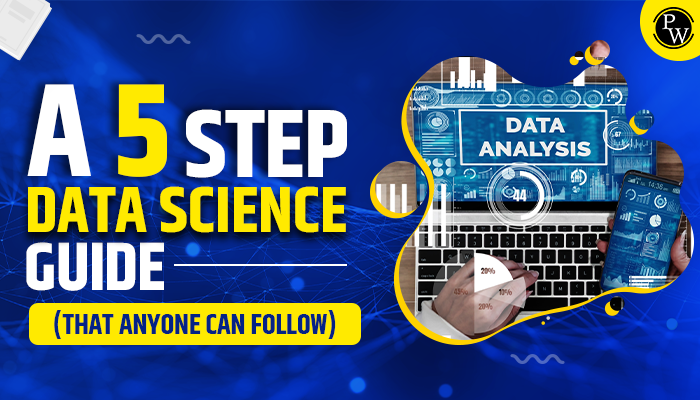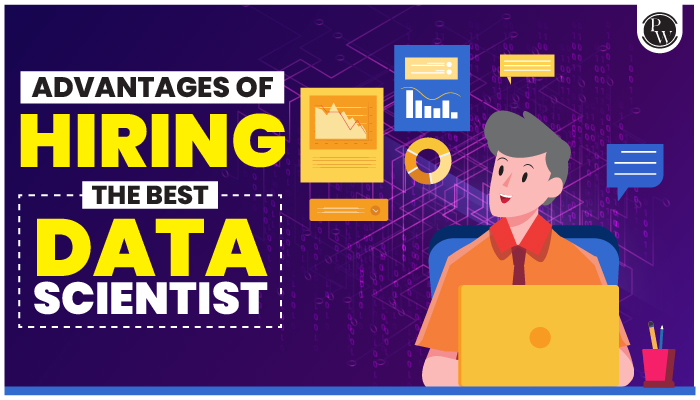How to Become a Data Scientist: In our data-centric world, data scientists play a pivotal role. They extract valuable insights from vast data, acting like modern-day wizards, revealing data’s hidden mysteries. They predict customer actions, optimise supply chains, and unlock cosmic secrets. If you’re interested in blending technology and problem-solving, a data science career could be ideal for you. We highly recommend a Full-Stack Data Science Course to take your data science career to the next level! In this article, we will discuss how to become a data scientist in 5 steps.

How to Become a Data Scientist in 5 Steps?
Here’s how to become a data scientist in 5 steps:
1. Establish a Solid Educational Foundation
To embark on the journey towards a career in data science, you must start with a strong educational base. Let’s delve deeper into this step:
- Bachelor’s Degree: When pursuing a bachelor’s degree, choose programs in computer science, statistics, mathematics, engineering, or fields closely related to data, such as economics or physics. These areas impart a strong grounding in quantitative and analytical competencies. In these programs, you’ll study subjects like calculus, linear algebra, probability, and statistics. Computer science programs emphasise programming expertise, while mathematics and statistics programs lay emphasis on mathematical rigour and statistical theory.
- Advanced Degrees: While a bachelor’s degree suffices for entry-level positions, pursuing advanced degrees, such as a Master’s or Ph.D., can unlock broader prospects and more lucrative salaries. In these programs, you’ll delve deeper into data science, machine learning, and artificial intelligence principles. Additionally, you’ll partake in research and collaborate with faculty on cutting-edge projects. Advanced degrees prove particularly valuable if you aspire to roles in academia or research institutions.
2. Gain Practical Exposure
Practical experience is a cornerstone of success in data science. Here’s a comprehensive breakdown of how to accumulate this experience:
- Internships: Internships are invaluable opportunities. Seek positions with companies, research institutions, or government agencies that offer hands-on involvement in data analysis, machine learning, or related fields. During your internship, you’ll work on real-world projects, collaborate with seasoned professionals, and apply the knowledge you’ve acquired through your studies.
- Personal Projects: Constructing a portfolio of personal projects is an excellent way to showcase your skills. Select projects that align with your interests and career objectives. Tese projects might involve analysing publicly available datasets, crafting predictive models, or solving real-world problems. Document your projects meticulously, outlining the problem, your methodology, the data, your analysis, and the outcomes. Sharing your code on platforms like GitHub is an effective means of exhibiting your work.
3. Hone Technical Skills
Data scientists rely on a robust set of technical skills. Let’s take a closer look at these skills:
- Programming: Python and R stand as the primary programming languages in data science. Python boasts versatility and widespread use for data manipulation, analysis, and machine learning. R is renowned for its statistical capabilities and data visualisation. Master these languages and achieve proficiency in their data science libraries.
- Data Manipulation: Effective data cleaning and manipulation are indispensable. Employ libraries like Pandas (Python) and doppler (R) to efficiently process, filter, and reshape data. Frequent tasks include merging datasets, addressing missing values, and generating new features.
- Machine Learning: A comprehensive grasp of machine learning forms the bedrock of data science. You must understand various algorithms, including linear regression, decision trees, and deep neural networks. Tools like Scikit-Learn, TensorFlow, and PyTorch equip you to implement machine learning models.
4. Develop Soft Skills
In addition to technical prowess, data scientists should nurture crucial soft skills:
- Critical Thinking: Critical thinking involves the capacity to dissect complex problems, assess data, and make informed decisions. This skill proves invaluable when designing experiments, evaluating the soundness of models, and deriving meaningful insights from data.
- Communication: Effective communication is paramount. You must be adept at articulating your findings, methodologies, and insights to non-technical stakeholders. This skill is vital for conveying the business significance of your work.
- Problem-Solving: Data scientists are adept problem solvers. Challenges will invariably arise during data analysis and modelling, demanding creative solutions. Problem-solving also entails selecting the most suitable algorithms and techniques for specific tasks.
Also check: Data Scientist Job Description: Role, Responsibilities
5. Make a Compelling Portfolio
Your portfolio serves as a testament to your capabilities. Here’s how to create an engaging portfolio:
- Projects: Encompass a variety of projects that spotlight your data science skills. These projects can encompass data analysis, machine learning, data visualisation, and more. Provide an in-depth explanation of each project, including the problem statement, your approach, data sources, the steps you undertook for data analysis, and the resulting outcomes. Highlight your contributions and the project’s impact.
- GitHub: Utilise GitHub to host your code and projects. This platform serves as a version control system and demonstrates your coding prowess. Maintain an organised and well-documented repository, consistently updating it with new projects and enhancements.
- Blog or Website: Creating a personal blog or website dedicated to data science can be a potent strategy for showcasing your expertise and establishing an online presence. Craft articles that elucidate data science concepts, share findings from your projects, and offer insights into the field. Your blog can assist potential employers or collaborators in comprehending your thought process and the depth of your knowledge.
What Does a Data Scientist Do?
A data scientist gathers, processes, and studies extensive data sets for valuable insights. They use statistical analysis, machine learning, and data visualisation to turn raw data into useful knowledge. Data scientists are adept problem solvers, capable of tackling intricate problems and making decisions based on data.
Data Science Across Industries
Data science is not confined to one field; it applies to various sectors. Industries like finance, healthcare, e-commerce, marketing, and technology highly value data scientists. In finance, they assist in risk assessment and fraud detection. In healthcare, data scientists improve patient outcomes through predictive analytics and personalised medicine. E-commerce benefits from data scientists by shaping recommendations and pricing strategies, and the possibilities are vast.
Practical Applications of Data Science
Data scientists influence our daily lives in ways we might not recognize. They enhance user experiences by powering recommendation systems on platforms like Netflix and Amazon. Businesses rely on data scientists to make informed decisions, such as streamlining supply chains and targeting customers. In healthcare, data scientists forecast disease outbreaks and evaluate treatment effectiveness. Environmentalists employ data science to study climate patterns and predict natural disasters.
Data Analyst vs Data Scientist: What’s the Difference?
Data analysts and data scientists hold distinct roles in the realm of data science, each with unique duties and expertise.
Differentiating Roles
Data Analysts: They focus on data collection, cleansing, and organisation to uncover insights and trends, utilising statistical methods for specific business inquiries. They create retrospective reports and dashboards facilitating data-driven decisions for organisations.
Data Scientists: With a more extensive scope, data scientists not only analyse data but also design predictive models and algorithms. Their responsibilities encompass data exploration, feature engineering, machine learning, and deploying data-driven solutions. They handle forward-looking and intricate tasks.
Responsibilities
Data Analyst Tasks
- Data Preprocessing: Preparing data for analysis by addressing missing or inconsistent data.
- Data Visualization: Crafting charts and dashboards to convey data-driven insights.
- Reporting: Generating reports to communicate findings and trends to stakeholders.
- Business Intelligence: Collaborating with teams to address specific business inquiries.
Data Scientist Tasks
- Data Exploration: Investigating complex datasets to unveil patterns and relationships.
- Machine Learning: Constructing predictive models, including regression, classification, and clustering algorithms.
- Feature Engineering: Selecting or creating relevant features for machine learning models.
- Model Deployment: Integrating machine learning models into production systems.
- Advanced Data Analysis: Utilising statistical methods and advanced analytics to solve complex problems.
Career Trajectories
- Data Analyst: Typically begins with a bachelor’s degree in fields like statistics or economics. With expertise in data analysis tools and techniques, they can advance to senior data analyst roles or transition into data science roles with additional training.
- Data Scientist: Demands advanced education – often a master’s or Ph.D. in data science, computer science, or related disciplines. Mastery of programming languages such as Python and R is crucial, coupled with expertise in machine learning and big data technologies. Career progression may lead to senior or lead data scientist positions or specialisation in areas like computer vision, natural language processing, or deep learning.
Why Become a Data Scientist?
- Data Science’s Profound Impact: In today’s data-rich world, data science plays a vital role. It enables the extraction of valuable insights from the vast data generated by our online activities and gathered by businesses and governments.
- Addressing Real-World Complexities: Data scientists hold a crucial role in resolving intricate real-world issues. They aid businesses in making informed decisions, optimising processes, and enhancing products and services through data-driven insights. For instance, they might assist a retail company in streamlining its supply chain, enable a healthcare organisation to predict disease outbreaks, or enhance user engagement on a social media platform.
- Predicting Future Trends: Data scientists utilise advanced statistical and machine learning techniques to forecast future trends and outcomes. This predictive ability proves invaluable in fields like finance, healthcare, and marketing. Predictive models find applications in stock price predictions and personalised marketing suggestions.
- Influence on Policy and Society: Data science’s impact extends beyond the corporate sector. Government agencies and non-profit organisations employ data scientists to inform policies, discern societal trends, and tackle pressing issues such as climate change, public health, and education.
Also check: Data Science for Beginners
The Rewards of a Data Science Career
Choosing the path of a data scientist offers various advantages, both professionally and personally:
- High Demand: The demand for data scientists remains strong, providing excellent job prospects. As organisations increasingly recognize the significance of data-driven decision-making, data scientists are in high demand across diverse industries.
- Versatile Skill Set: Data science is versatile, allowing professionals to work in various industries and domains. Whether your passion lies in healthcare, finance, sports, or any other area, data science skills can be applied to address challenges and create a positive impact.
- Continuous Learning: Data science is an ever-evolving field, offering constant opportunities for learning. This dynamic environment keeps the work engaging and intellectually stimulating. Data scientists often find themselves at the forefront of technology, which can be personally fulfilling.
- Competitive Compensation: Data scientists are well-compensated due to their specialised skills and the high demand for their expertise. Competitive salaries serve as a strong incentive for entering the field.
- Global Opportunities: Data science is a globally recognized profession. Skilled data scientists can explore opportunities both in their home country and abroad, making it a profession with the potential for international mobility.
The Intersection of Technology and Problem-Solving
One of the most captivating facets of data science lies in its intersection of technology and puzzle-solving. Data scientists are akin to contemporary detectives, utilising data as clues to solve intricate problems. They harness an array of tools and technologies to unveil concealed patterns and insights. If you harbour a fondness for technology and possess a knack for solving puzzles, a career in data science might be your ideal pursuit.
What Skills Do Data Scientists Need?
Data scientists need a diverse skill set, blending tech expertise with soft skills. These abilities are crucial for extracting valuable data insights and sharing findings. On the tech side, data scientists must master programming languages like Python and R, as these are primary tools for data analysis and machine learning. Proficiency in data manipulation (pandas) and visualisation (Matplotlib or Seaborn) is vital for processing and presenting data. A strong grasp of machine learning, statistics, and data modelling is necessary for building predictive models and finding meaningful patterns.
Beyond tech, soft skills matter. Data scientists must excel in critical thinking, forming data-based hypotheses and problem-solving strategies. Effective communication is key for presenting complex findings to non-tech stakeholders, driving data-driven decisions. Problem-solving is critical in tackling real-world issues.
Collaboration is essential, as data projects often involve cross-functional teams. Adaptability and curiosity are crucial in a field that constantly evolves, requiring data scientists to keep up with new techniques. To succeed as a data scientist, continuous skill refinement is vital, creating a well-rounded skill set for success in this dynamic, high-demand profession.
What is an Average Data Scientist Salary?
Understanding the salary prospects in the field of data science is crucial when contemplating a career in this profession. The salaries of data scientists can be quite diverse, primarily influenced by various factors, including experience, education, location, and industry. The average data scientist salary in India is INR 6 Lakh per year.
Factors Influencing Salary
- Experience: Experience is a fundamental determinant of a data scientist’s salary. Entry-level data scientists usually earn less than their more seasoned counterparts. As you accumulate practical experience and demonstrate your proficiency in the field, your market value increases, subsequently leading to higher salaries. For example, a data scientist with several years of experience may command a substantially higher salary compared to someone who has just entered the field.
- Education: The educational background of a data scientist significantly affects their earning potential. Individuals with advanced degrees, such as a master’s or Ph.D. in a relevant field like data science, computer science, or statistics, often receive higher salaries. However, it’s essential to understand that while education plays a role, practical skills, and the ability to apply knowledge in real-world situations are equally vital.
- Location: Geographical location plays a significant role in determining a data scientist’s salary. Salaries can vary significantly from one region to another due to differences in the cost of living and demand for data science professionals. In major technology hubs like San Francisco, New York, and Silicon Valley, where the cost of living is high and the demand for data scientists is intense, salaries are generally higher. On the other hand, salaries in regions with lower living costs may be lower, but they can still offer a competitive income in terms of local standards.
- Industry: The industry in which a data scientist works can also significantly impact their earning potential. For instance, data scientists employed in sectors such as finance, healthcare, and technology often receive higher salaries due to the complexity and data-driven nature of their work. On the other hand, data scientists working in government or nonprofit organisations may receive somewhat lower salaries, but these roles often come with other non-financial benefits and a sense of purpose.
Earning Potential with Experience:
As you progress in your data science career, your earning potential can grow significantly. Accumulating experience and developing specialised skills make you more valuable to employers, leading to salary increases and additional career opportunities. For example, senior data scientists and data science managers typically earn significantly more than entry-level professionals.
Also check: How to Transition from Business Analyst to Data Scientist in 2023
Conclusion
Becoming a data scientist demands effort and offers great rewards. A strong education, hands-on experience, technical expertise, and an impressive portfolio create avenues to exciting opportunities in the data-driven realm. Data science isn’t merely a job; it’s a gateway to tackling intricate problems, guiding decisions, and shaping the future. By consistently expanding your knowledge and embracing the ever-changing data landscape, you position yourself at the forefront of innovation. Learn Data Science from the Experts with the PW Skills Full Stack Data Science Pro course. Gain the Skills You Need to Solve Real-world Problems. Enrol Today and Start Your Journey to a Rewarding Career!
FAQs
Must I be a mathematical genius for data science?
While a strong maths background aids, tools and libraries simplify complex maths. Good maths understanding is essential, but genius status is not required.
Is data science confined to specific industries?
No, it spans various sectors like healthcare, finance, e-commerce, and more. It's versatile, offering career opportunities in diverse fields.
Is data science a solitary or collaborative job?
Data scientists often work with teams, including engineers, domain experts, and business analysts. Effective communication is crucial.
Which programming languages apply in data science?
Python and R are most common. Python is preferred for its versatility and libraries, while R excels in statistics.
Is a Ph.D. necessary for a successful data science career?
A Ph.D. isn't mandatory. Many have bachelor's or master's degrees. A Ph.D. can benefit research roles or distinction in the field.
Which industries offer top data scientist salaries?
Finance, healthcare, and tech tend to pay the highest salaries due to data's critical role in decision-making.
Can data scientists work remotely?
Yes, many data science roles allow remote work, especially with the rise of remote work popularity.
What's the future outlook for data science careers?
Data science is poised to grow, with rising demand for skilled professionals as businesses rely more on data-driven insights.
Are there ethical concerns in data science?
Yes, data scientists must address ethics like data privacy, bias, and responsible data use when working on projects.
Can I specialise in data science?
Data science offers specialisations like machine learning, natural language processing, computer vision, and data engineering, tailored to your interests and career goals.




